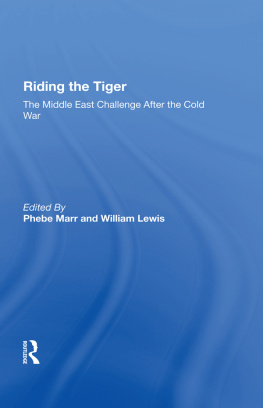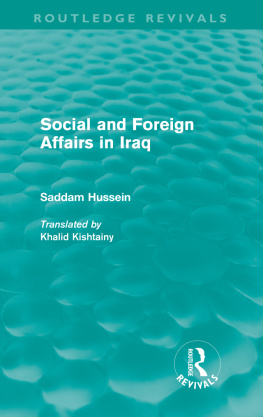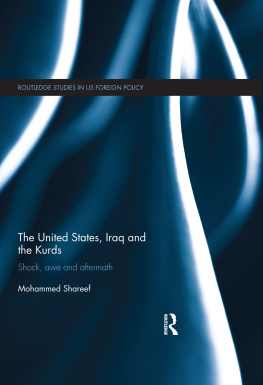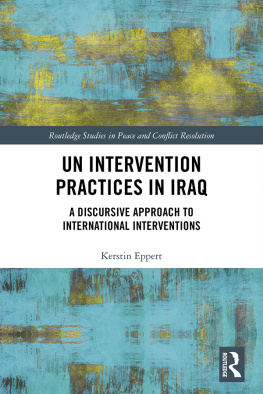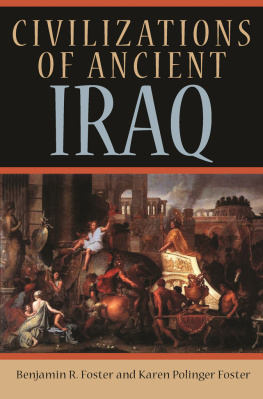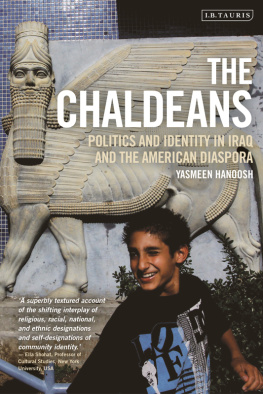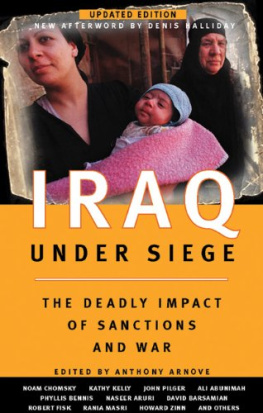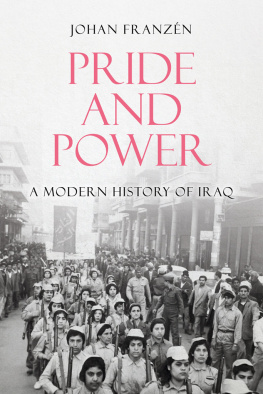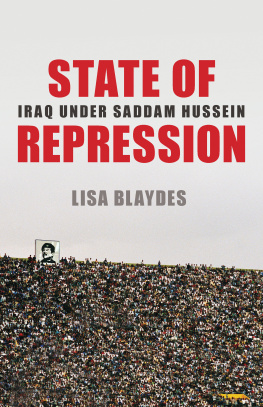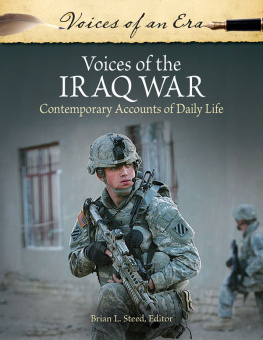Although Iraq has now been a modern stateof modest sizefor almost a century, few countries have had such a potentially promising future, yet undergone such a turbulent history, or, in recent years, been the focus of such world attention. Wars, sanctions, occupation, and brutal civil strife have brought abrupt, severe, and often disabling change and now, with the incursion of an Islamic terrorist group, the Islamic State, have almost brought the state to the brink of collapse. These events have made it difficult to chart Iraqs future path and to relate these changes to Iraqs enduring continuities. Yet the continuities will remain. Iraq has had a remarkably rich and varied history. Even before recent headlines made Iraq a household word in the West, it was difficult to do justice to the complexity of Iraqs modern history and to explain the impact of rapid change and modernization on a society going back six millennia. Events since 2003, with their profound discontinuities and uncertainties, have now made this task more challenging, but also more urgent. Although much more is now known (but possibly misunderstood) about contemporary Iraq, even more remains opaque. This revision will not seek to provide answers to the future but rather to identify the forces at work, particularly since 2003, the trends and directions in evidence, and to relate them to Iraqs past history since its founding as a state in 1920.
This book is not meant to be an exhaustive and detailed history of modern Iraq. My aim instead has been to present a clear, readable one-volume account of the emergence of modern Iraq and the forces that shaped it. To understand how and why Iraq has reached this point in the context of a longer historical perspective, I have drawn extensively on many perceptive monographs and studies on modern Iraq. I have tried to include enough general interpretation of events to make the country and its people understandable and enough detail to give color to the events described. Above all, I have tried to be evenhanded in depicting the course of events and to avoid oversimplifying complex situations. The concluding chapters of this volume and the material on the Islamic State and its impact on Iraq are the work of my colleague, Ibrahim al-Marashi, to whom I owe a considerable debt. He has also been of enormous help in making suggestions and amendments to the rest of the book. Although the book is directed at the general reader, I hope that scholars and students of the Middle East as well as many of those now traveling and working in Iraq will find it useful.
The material has been grouped around several themes that, in my view, have dominated Iraqs history from 1920 to the present. The first is the creation and construction of a modern state within the boundaries bequeathed to Iraq by the British in the 1920s and the search by Iraqs leaders for a cultural and national identity capable of knitting together the countrys various ethnic, religious, and social groups. This issue of identity and its impact on the Iraqi state is paramount today. A second theme is the process of economic and social development, a process that began at the end of the nineteenth century but greatly accelerated in the 1970s, although it has suffered a multitude of setbacks recently through war, sanctions, social disruption, and now more war. A third, and most essential, theme is the development of political institutions and ideologies and their interrelationship with domestic society and the world outside Iraq. The book seeks to show both changes and continuities in Iraqs political dynamics as well as to explain the results of a brutal totalitarian system, like that of Saddam Husain, on society, the impact of foreign occupation on the political system and the emergence and deepening of ethnic and sectarian fractiousness in Iraq today. A fourth theme is that of foreign domination and the interaction of the newly created state with the West, the role of Iraqs neighbors and how Iraq interacts with the global environment. This theme has, of course, intensified with the U.S-British occupation of 2003 and its aftermath. Although Iraqs future is uncertain at this point, it is better understood through historical perspective.
In recent years a growing and valuable body of literature on Iraq written by Iraqis themselves has appeared, including memoirs, firsthand accounts, and studies. I have drawn on these whenever possible. Since 2003 a veritable flood of books and articles by journalists and practitioners has appeared in English about the occupation and its aftermath. Even though no one can read all of them, a number, especially those by Iraqis, have been very useful, and I have used them extensively. As the Western side of this story can be readily accessed in these works, I have tried to focus in this book on Iraq. Freedom of the press and media in Iraq and the spread of the Internet to Iraqis have provided a multitude of new sources, such as blogs, which I have used selectively. Quantitative data and statistical reports from the United Nations, the World Bank, and international organizations, such as International Organization for MigrationIraq, have also increased since 2003 and provide invaluable source material. The reader is warned, however, that statistics are still difficult to gather, are often subject to controversy, and should be treated with caution.
N EW TO T HIS E DITION
The Third Edition concluded with events in Iraq as of 2011. The Fourth Edition covers the effects of the Arab Spring on Iraq, including the ramifications of the collapse of neighboring Syria during its civil war and the subsequent reemergence of the Islamic State (IS) and its conquest of Mosul and large swathes of Iraqi territory in the summer of 2014. This edition went to the presses after the battle to liberate Mosul had begun in November 2016. While the futures of Iraq and IS are fluid, the ramifications of the IS intrusion into Iraq has been profound, not just for Iraq, Syria, and the Middle East, but in terms of global security as well. The IS occupation of Iraqi territory began in January 2014 with the capture of Falluja, and while its holdings in Iraq have been significantly reduced as of the end of 2016, Iraq has nonetheless gone through significant transformations within the span of those two years. While this updated edition deals with the military campaign against IS since 2014, it also examines the socioeconomic and cultural disruptions since then, ranging from internally displaced peoples to the destruction of Iraqs pre-Islamic and Islamic heritage. This Fourth edition also provides an update of the endemic problems in Iraqs development since 2003, including a fractured political landscape, a state rife with endemic corruption, and an economy dependent on the vicissitudes of the international oil market. Those dynamics continue to persist and are likely to persist, regardless of the governments success in combatting IS.


